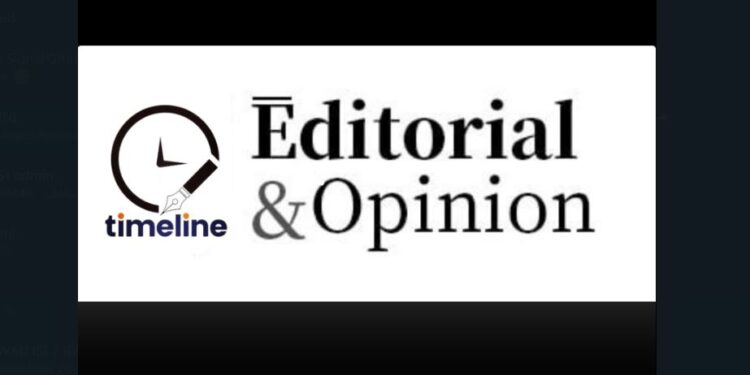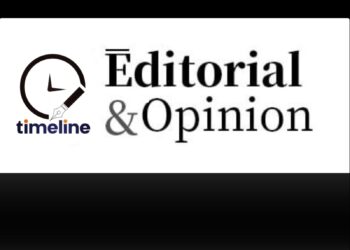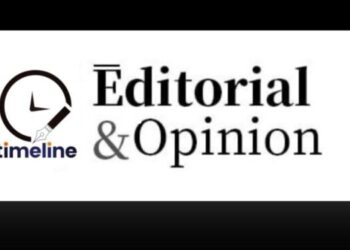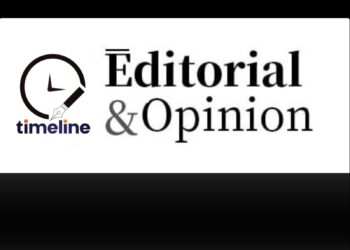(Written by: Abdul Basit Alvi)
In today’s interconnected world, the rapid flow of information has transformed how we consume news and engage with our surroundings. While technology has granted us unprecedented access to information, it has also led to the widespread spread of misinformation and disinformation. One of the most concerning issues in the digital era is the rise of “fake news.”
Fake news refers to fabricated or altered stories that are presented as authentic news, often with the aim of misleading or deceiving the public. As the impact of fake news continues to grow, it is vital to understand the factors behind its rise, its effects on individuals and societies, and the strategies we can use to fight it. Fake news can take various forms, from completely made-up stories to exaggerated headlines that mislead readers. Though the term is now widely used, it’s important to differentiate between the types of false information. Unintentional misinformation is when inaccurate information spreads without the intent to deceive, such as someone sharing a news story they believe is true, even though it isn’t. Deliberate misinformation is when false information is purposely spread to manipulate, deceive, or serve a particular agenda. This is often seen in political campaigns or malicious efforts to harm individuals or groups. Distorted reality involves presenting real events with the intent to mislead or cause harm, like taking events out of context or editing facts selectively to shape a misleading narrative. Satirical content, while meant to be humorous, can sometimes be mistaken for legitimate news, further fueling confusion when shared without recognizing its comedic intent.
The rise of social media has made it easier for fake news to spread quickly. Unlike traditional media outlets, social platforms provide an open space for anyone to publish content, making it harder to differentiate between reliable news and fabricated stories. Algorithms that prioritize content generating high engagement, such as sensational or emotionally charged stories, only make the problem worse.
Several factors have fueled the prevalence of fake news in today’s society. Platforms like Facebook, X, Instagram, and TikTok have become the go-to sources of news for millions around the world. While these platforms provide a space for diverse perspectives and the sharing of ideas, they also make it easier for misinformation to spread, often virally, before it’s debunked or removed.
Many people lack the critical thinking skills needed to evaluate the information they encounter online. The fast-paced, bite-sized nature of social media content discourages in-depth research and fact-checking. Without media literacy, people are more likely to accept and share fake news, especially when it aligns with their own beliefs or emotions. This tendency, known as confirmation bias, is often exploited by fake news creators, who tailor false narratives to appeal to specific political, social, or ideological groups. This contributes to the formation of “echo chambers,” where individuals are exposed only to information that supports their views, deepening societal divisions.
Furthermore, fake news can be more profitable than accurate news. Sensationalized headlines and click-worthy stories attract more engagement, which in turn boosts ad revenue. This creates an incentive for some individuals or groups to produce fabricated stories, prioritizing attention over truth. Techniques like clickbait, using exaggerated or misleading headlines to generate traffic, have become common. In addition, fake news has become a powerful tool for political manipulation. Often, political groups, or interest organizations deploy disinformation campaigns to shape public opinion, sway elections, or undermine their opponents. For instance, during the 2016 U.S. Presidential Election, fake news was widely used to manipulate voters and create confusion around candidates and policies. The impact of fake news is significant and far-reaching, affecting individuals, communities, and the integrity of democratic processes. Fake news undermines trust in reliable news sources. When people are consistently exposed to false information, it becomes harder to distinguish between credible reporting and misinformation. This can lead to a growing cynicism or indifference toward the news, contributing to a decrease in civic participation. Fake news also plays a powerful role in shaping public opinion. Misleading or fabricated stories can influence perceptions of political candidates, public policies, and societal issues. In some cases, these false narratives can even shape entire political movements, distorting the truth and influencing voting behavior, thereby undermining democratic processes.
The potential for fake news to incite violence and fuel hatred is also concerning. False accusations about individuals or groups can provoke discrimination, unrest, and violence. For example, in 2018, false rumors about a specific ethnic group circulated on social media in Myanmar, leading to violent clashes and a humanitarian crisis. In the area of public health, fake news can have disastrous effects. Misinformation about vaccines, medical treatments, or disease outbreaks can lead to public health emergencies, as seen during the COVID-19 pandemic. False claims about vaccine safety, in particular, contributed to vaccine hesitancy in many communities, hindering efforts to control the virus.
Fake news can also result in significant financial damage. False rumors about companies or individuals can harm reputations, cause stock prices to plummet, or spark unnecessary panic. In some cases, fake news has been linked to fraudulent products or scams, costing consumers millions of dollars.
In response to the growing threat of fake news, many countries have enacted strict laws and penalties aimed at curbing the spread of misinformation and disinformation. These laws vary widely depending on the region, reflecting differing political environments, cultural contexts, and freedoms of expression. Singapore, for example, has adopted some of the world’s toughest regulations. In 2019, the country passed the Protection from Online Falsehoods and Manipulation Act (POFMA), granting authorities the power to demand the removal or correction of false online content. The government argues that misinformation threatens public safety, social harmony, and national security. The POFMA allows government ministers to issue orders to individuals, media outlets, and social media platforms to take down or amend content deemed false. Failure to comply can lead to substantial fines or imprisonment, with individuals facing up to SGD 1 million for repeat offenses, and companies facing even higher penalties. Those found guilty of deliberately spreading harmful falsehoods may face up to five years in prison and additional fines.
Russia has also taken a hardline stance on fake news, implementing laws that target online content deemed false or damaging to national security. In 2019, Russia introduced a “fake news” law that criminalizes the spread of false information online, particularly content that undermines government authority, incites panic, or disrupts public peace. Under this law, individuals and organizations can face criminal charges for spreading fake news that threatens public order or the country’s national interests, with punishments including fines, imprisonment, and the potential closure of websites. Media outlets, social media platforms, and websites that don’t adhere to the law could face substantial fines. Companies that fail to remove fake news within 24 hours may be fined up to RUB 1.5 million (roughly USD 20,000). Russia’s communications regulator, Roskomnadzor, oversees the enforcement of this law. The agency has the authority to block websites, issue warnings, and even require companies to take down content considered false or harmful. In Europe, Germany has one of the most extensive legal frameworks designed to combat fake news. In 2017, Germany passed the Network Enforcement Act (NetzDG), targeting social media platforms and holding them accountable for removing harmful or illegal content, including fake news. The law mandates that social media platforms with over two million users in Germany remove or block illegal content, such as hate speech, fake news, and extremist material, promptly. Content flagged by users must be reviewed within 24 hours. If platforms fail to comply, they can face hefty fines. Companies can be fined up to EUR 50 million (around USD 54 million) for not properly addressing harmful content, including misinformation. Social media platforms are also required to publish regular reports on how they handle complaints about fake news and other illegal content. The law ensures that these platforms take responsibility for the content shared on their networks.
France has also taken significant steps to tackle fake news, particularly in the context of elections. In 2018, France passed the Anti-Fake News Law, part of a broader effort to protect the democratic process from foreign influence and misinformation. The law empowers the French government to remove fake news during election periods, focusing on content that could distort democratic outcomes, such as false information influencing voting behavior or public opinion. It also requires online platforms to disclose details about political ads, including their sponsors and spending. This transparency helps prevent disinformation campaigns from undermining democracy. Individuals or organizations found guilty of spreading fake news with malicious intent during an election face fines of up to EUR 75,000 (about USD 81,000) and up to one year in prison.
Thailand has introduced laws to control the spread of fake news, particularly political content that may threaten national security or public order. The country’s Computer Crime Act has been used to prosecute individuals for disseminating fake news online. Those found guilty of spreading false information that harms the country’s reputation or public order can face penalties, including imprisonment for up to five years and fines. The Thai government has the power to block websites or social media accounts identified as spreading fake news, especially when it relates to sensitive subjects like the monarchy or political unrest. In the U.S., the approach has primarily relied on self-regulation by tech companies, rather than government-imposed laws. The First Amendment protects freedom of speech, making it difficult to pass laws that directly penalize fake news. However, individuals or organizations can file lawsuits for defamation if false statements damage their reputation. Following concerns over foreign interference in the 2016 U.S. election, laws like the Foreign Agents Registration Act (FARA) and the Honest Ads Act were introduced to enhance transparency in political ads and penalize foreign actors spreading disinformation. Tech companies such as Facebook and X have faced increasing pressure to combat fake news by removing misleading content and improving transparency.
During his previous presidency, Donald Trump became closely associated with the term “fake news,” using it to describe any media or news outlet he perceived as hostile or misrepresenting his actions. His frequent use of the term served as a direct challenge to mainstream media, portraying it as biased, dishonest, and aimed at undermining his administration. Notably, Trump leveraged social media, particularly Twitter, to engage directly with the media, dismissing negative coverage and calling out journalists and outlets by name. He famously labeled organizations like CNN, The New York Times, and The Washington Post as “fake news,” often encouraging his supporters to distrust the media. More broadly, he argued that the media’s portrayal of events was exaggerated or distorted, occasionally referring to them as the “enemy of the people.” This rhetoric became a central aspect of his political strategy, rallying his base and positioning himself as a defender of “alternative facts” against a supposedly corrupt media.
These examples highlight how different countries have adopted various legal measures to combat the spread of fake news. They also underscore Pakistan’s right to take similar actions in addressing the issue. In this context, the Pakistani National Assembly recently passed the Peca Amendment Bill. The bill introduces a new provision, Section 26(A), which penalizes individuals who intentionally spread fake news online. It states that anyone who knowingly disseminates false information through any information system that could incite fear, panic, or social unrest will face punishment, including up to three years of imprisonment, a fine of up to Rs 2 million, or both.
The bill also proposes the creation of the Social Media Protection and Regulatory Authority, which would oversee various functions related to social media, such as education, awareness, training, regulation, and the blocking of harmful content. The authority would allow individuals affected by fake news to request the removal or blocking of misleading content, with the authority mandated to act within 24 hours of the request. The proposed changes also suggest that social media platforms may be required to register with the authority, pay a prescribed fee, and comply with its regulations. The bill also specified that, in addition to the requirements outlined in the act, additional conditions or requirements may be set when enlisting a social media platform. It stated that the authority would have the power to issue orders to a social media platform to remove or block online content if it contradicted Pakistan’s ideology, incited the public to break the law, encouraged vigilantism, or aimed to coerce, intimidate, or terrorize the public, individuals, groups, communities, government officials, or institutions. The authority could also act if the content incited the public or any segment of the public to damage government or private property. The bill also outlined that content which coerces or intimidates the public, preventing them from carrying out their lawful activities and disrupting civic life, would fall under its scope. It specified that content inciting hatred or contempt based on religious, sectarian, or ethnic grounds to provoke violence or internal disturbances would also be addressed. Additionally, the law would apply if the reported content was obscene or pornographic, violating applicable laws; known or likely to be false beyond a reasonable doubt; contained defamatory statements about individuals, including members of the judiciary, armed forces, parliament, or provincial assemblies; or promoted terrorism and violence against the state or its institutions.
The bill further proposed that any part of parliamentary or provincial assembly proceedings that had been ordered to be expunged would not be broadcast or made available on social media platforms. Efforts would be made to ensure that a fair account of the proceedings is released. Additionally, the statements from banned organizations or their members would not be allowed to be streamed or made available on social media in any form.
The bill also required social media platforms to implement a transparent and effective procedure for handling complaints related to unlawful or offensive content, offering users an easily accessible, recognizable, and permanent method for submitting such complaints. It proposed the creation of a Social Media Complaint Council to address complaints about violations of cybercrime laws. If any violation occurs, the Social Media Protection and Regulatory Authority would refer the case to the Social Media Protection Tribunal, which would resolve all matters within 90 days.
In fact, in today’s digital age, news spreads faster than ever, and with this speed comes the risk of misinformation spreading just as quickly. This issue has become especially significant in Pakistan, where the rise of fake news poses a growing concern. From social media platforms to traditional news outlets, the spread of false information has the potential to disrupt communities, fuel unrest, and deepen divisions. The need to tackle fake news in Pakistan has become more pressing than ever, as its effects can lead to significant societal damage and political instability. One of the most harmful outcomes of fake news in Pakistan is its potential to deepen divisions within society, whether political, ethnic, or religious. False information, especially when aimed at specific groups, can intensify existing tensions and erode trust between communities. Pakistan’s political landscape has always been highly polarized, and fake news, particularly during elections, has been used to manipulate public opinion, spread disinformation about candidates, and undermine confidence in the electoral process. Fake reports of corruption, criminal activity, or misinformation about policies can distort public perception and influence voting behavior, often based on fabricated stories. In a country with diverse ethnic and religious communities, fake news has the potential to deepen existing divisions. Misinformation targeting specific groups can spark violence, riots, and discrimination. For example, rumors about religious or ethnic minorities can fuel hatred, leading to serious social consequences, including loss of life.
The spread of fake news also poses a major threat to national security. False reports about military operations, political leaders, or national crises can destabilize the country, provoke violence, and create confusion during critical times. Pakistan has faced security challenges over the years, and during periods of unrest, fake news can escalate these problems. Misinformation about terrorism or attacks can trigger public panic and chaos. False reports, particularly on social media, can incite mobs or lead to attacks on innocent people, undermining national stability. In many cases, these falsehoods spread faster than the truth, leaving law enforcement and the government struggling to control the narrative.
Fake news campaigns can also harm the efforts of security forces and government agencies. Spreading lies about military operations or law enforcement tactics can damage their credibility and obstruct their work. If citizens believe false narratives about their country’s military or police forces, it can lead to unnecessary public resistance and undermine national defense efforts.
One of the most significant impacts of fake news is its ability to erode trust in traditional media and journalism. In Pakistan, media outlets play a vital role in informing the public, shaping public opinion, and holding the government accountable. However, as fake news spreads, the credibility of news organizations is increasingly questioned. When the public encounters fake news through various platforms, they may begin to lose trust in legitimate news sources. If fake news continuously circulates through social media or even mainstream media, people become skeptical of all news, making it hard to differentiate between fact and fiction.
In some cases, media outlets themselves may be complicit in spreading fake news. Whether due to political affiliations or financial motivations, some media houses may promote biased or fabricated stories to serve specific interests. This damages public trust and undermines the role of media as an objective institution.
Social media platforms have become one of the main channels for spreading fake news in Pakistan. While these platforms offer space for free expression and political discussion, they are often misused to spread harmful misinformation. The rapid pace at which information spreads on social media makes it difficult to verify or control stories before they go viral. These platforms amplify the voices of those sharing fake news, particularly in echo chambers where individuals with similar beliefs reinforce each other. This creates a cycle where falsehoods are repeated and accepted as truth, making people more resistant to opposing viewpoints and further deepening divisions in society. Unlike traditional media, social media in Pakistan is largely unregulated when it comes to controlling misinformation, and the lack of fact-checking mechanisms or accountability allows fake news to flourish unchecked. In many instances, malicious actors take advantage of the lack of oversight to disseminate harmful content without fear of repercussions.
The economic impact of fake news in Pakistan can be profound. False rumors about companies, markets, or economic policies can cause panic selling, significant financial losses, and a decline in investor confidence. In certain cases, fake news about businesses can lead to stock market crashes or the collapse of markets within specific sectors. Misinformation, particularly about industries such as banking, real estate, and trade, can spark widespread panic and prompt investors to make hasty, ill-informed decisions. For instance, fake reports about the closure of banks or the collapse of industries can directly impact the economy, triggering widespread financial instability. Businesses, particularly those in competitive sectors, can suffer long-term reputational damage due to fake news. False accusations, such as fabricated reports of fraud, product safety concerns, or corporate misconduct, can tarnish a company’s brand, decrease sales, and result in significant financial setbacks.
It is crucial to recognize that the primary focus of the new laws and measures is to regulate social media. Some anti-state groups exploit social media to spread false information, using unethical tactics to gain popularity and make their fake news go viral. They take advantage of system weaknesses to disseminate misinformation. In contrast, Pakistan’s print media and its journalists are already well-established and responsible, with no significant issues of fake news in this sector.
The key point is that those who have not done anything wrong need not fear. Laws and regulations are in place to identify and punish wrongdoers, ensuring peace, harmony, and law and order in society. It is only those who seek to exploit fake news to destabilize and defame Pakistan and its institutions who should be afraid of the Peca Amendment Bill. The people of Pakistan fully support this bill and urge the government to take even stronger action against anti-state elements.

























